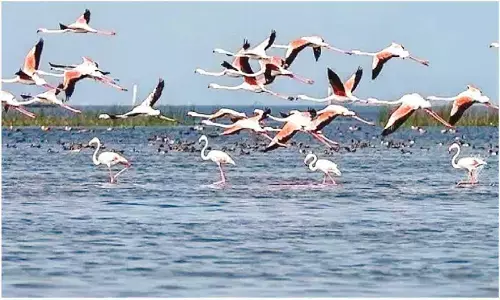Markets with live wild animals create utmost risk for human health: Lancet

Markets with live wild animals create utmost risk for human health: Lancet (Photo/IANS)
Markets selling live wild animals pose the greatest risk to human health and biodiversity, say researchers while arguing against the blanket ban on "wet markets" around the world.
New York: Markets selling live wild animals pose the greatest risk to human health and biodiversity, say researchers while arguing against the blanket ban on "wet markets" around the world.
After finding a link between Covid-19 and a seafood market in China's Wuhan, many governments around the world have pushed for the closing of so-called "wet markets". While the origins of the virus are still unknown, a widespread shuttering of all wet markets could have the unintended consequences of disrupting critical food supply chains, stimulating an unregulated black market for animal products, and stoking xenophobia and anti-Asian sentiment, said researchers from Princeton University in New Jersey, US.
The paper, published in the journal The Lancet Planetary Health, found that the markets that sell live animals carry the greatest risks to human health and biodiversity, especially if they are selling live wild animals -- which are connected to emerging infectious diseases.
These are the markets that policymakers should target as they attempt to mitigate future infectious disease outbreaks, the researchers said. Targeting these markets would also prevent disruptions to local food supply chains while reducing human health and biodiversity dangers.
On the other hand, a majority of the informal markets, which specialise in fresh meat, seafood, and other perishable items in open-air settings, pose little risk to human health or biodiversity.
"In the wake of the Covid-19 pandemic, many nations temporarily shut down their wet markets, but that's not going to last -- eventually some will be opened up while others will be more closely regulated or closed altogether," said David S. Wilcove from the Princeton's Center for Policy Research on Energy and the Environment.
"Our work presents a way to tell which ones are worth focusing on for tighter regulation or closure," he added.
Further, the researchers also emphasised that these markets alone are not solely responsible for global pandemics. Instead, they represent one node of zoonotic transmission potential along the global wildlife trade supply chain.
In April, the World Health Organisation (WHO) had called for a halt to the sale of live wild mammals in food markets to prevent the emergence of new diseases such as Covid-19.
"WHO, the OIE (World Organisation for Animal Health) and the UNEP (United Nations Environment Programme) call on all national competent authorities to suspend the trade in live caught wild animals of mammalian species for food or breeding and close sections of food markets selling live caught wild animals of mammalian species as an emergency measure unless demonstrable effective regulations and adequate risk assessment are in place," a statement said.
The agencies said there was a strong association between sale of live wild animals in markets and the emergence of new viruses in humans.











